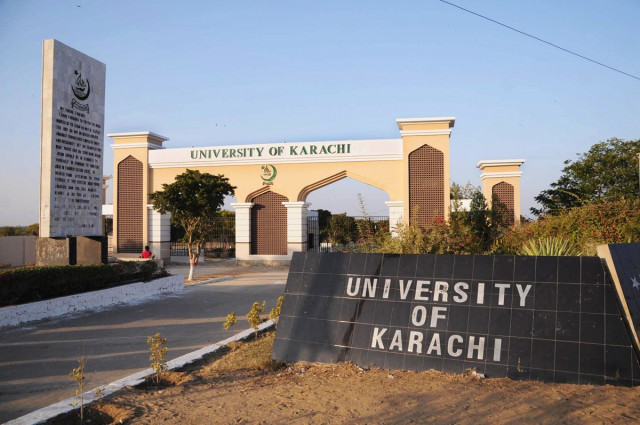Radicalisation of our universities
Pakistani universities have been housing extremist and violent groups of various strands for decades

University of Karachi. PHOTO: MOHAMAMD NOMAN/EXPRESS
Pakistani university among world's top 300 business schools
Pakistani universities have been housing extremist and violent groups of various strands for decades. Most of these groups operating as part of ‘student wings’ of political parties of either side of the political divide, ‘left’ and ‘right’ or ‘secular’ and ‘religious’. For decades, these student wings of political parties have been involved in violence and outright terrorism, if the term means injecting fear and arousing feelings of intimidation among opponents or generally within the student community. Moreover, it is an open secret that students associated with one Muslim clerical political group took part for at least a decade in the anti-Soviet Afghan resistance (1980-1988) and even afterwards in the Afghan civil war in the 1990s. Then, members of the so-called ‘nationalist’ parties’ student wings, including the MQM, have been getting militant training in Afghanistan and are involved in militant and terrorist activities across Pakistan. Thus in our universities, militancy and violence have had a historical background and context, and this must not be forgotten when analysing the recent revelations of the association of members of ASP with KU. Albeit, it is still surprising that a banned terrorist organisation has spread its tentacles within our universities and among students of secular educational institutions and disciplines, more specifically of natural sciences and ICTs that have been found to be the moving spirits behind a wave of violent terrorism in the country.
Observers would agree with the argument that violence and extremism has been rising at these institutions. We have the example of Mashal Khan, who was ruthlessly killed by his own university mates at Abdul Wali Khan University, for his alleged blasphemous views. Those who killed him were ‘students’ and belonged to all shades of the political spectrum, including those parties currently championing the cause of ‘non-violence’, and the very university where the incident occurred has been named after one of their leaders.
From macro-sociological standpoint, violence in Pakistani universities is the result of influence of growing radicalisation and militancy in our society. Universities being part of the wider culture cannot escape the impact of trends in the society. Psychosocially, violence and extremism has increased in Pakistani society and many, if not most, people have internalised that employing violent and extremist tactics are the way forward and are instrumental in achieving their otherwise straightforward objectives.
Radicalisation: Universities – incubators of fanatical minds?
Individual personalities develop through socialisation within the context of wider culture and social psychology along with social contacts with other societies and cultures. Personality development of Pakistani students has largely been influenced by these national and global trends and the outcome of which is extremism, militancy and violence. The institutional culture of Pakistani universities has been influenced by the absence of merit, group-thinking, prevalent nepotism, financial and moral corruption. Therefore, instead of these institutions playing their role in providing purpose and direction to society, they have been influenced by violent trends in society, and this is really alarming with no relevant institution having any deeper understanding of the phenomenon of extremism and terrorism. Resultantly, they are unable to come up with an effective counterstrategy.
Published in The Express Tribune, September 13th, 2017.
Like Opinion & Editorial on Facebook, follow @ETOpEd on Twitter to receive all updates on all our daily pieces.















COMMENTS
Comments are moderated and generally will be posted if they are on-topic and not abusive.
For more information, please see our Comments FAQ